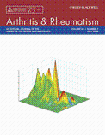Variation at the ANP32A gene is associated with risk of hip osteoarthritis in women
Abstract
Objective
The ANP32A gene encodes a tumor suppressor molecule that plays a regulatory role in apoptosis and interferes with canonical Wnt signaling in vitro. We undertook this study to test whether genetic variation at ANP32A was associated with osteoarthritis (OA) in women.
Methods
Single-nucleotide polymorphisms (SNPs) in the ANP32A gene were genotyped in 438 control women, 425 women with total knee replacements (TKRs), and 537 women with total hip replacements (THRs) from the Nottingham case–control study as well as in 820 women from the population-based Chingford Study cohort for whom hip and knee radiographs were available. The most highly associated SNP was further tested in women from the Rotterdam Study (131 with THRs, 633 with knee OA, and 1,567 controls) and the TwinsUK Study cohort (67 with THRs, 43 with TKRs, and 358 controls), for a total of 2,170 patients with OA and 2,849 controls.
Results
The ANP32A transcript was abundantly expressed in normal and OA articular cartilage. Three SNPs in the ANP32A gene were significantly associated in Nottingham patients with hip OA, but not knee OA. One of these (rs7164503) was associated with hip and knee OA in the Chingford Study cohort and with THR in the TwinsUK Study cohort, but the association was not statistically significant in the Rotterdam Study. When we combined hip data from all 4 cohorts, we found that the minor allele of rs7164503 was associated with a significantly lower risk of hip OA (Mantel-Haenszel odds ratio 0.67 [95% confidence interval 0.53–0.84], P < 3.8 × 10−4) and that a similar trend was observed for knee OA (Mantel-Haenszel odds ratio 0.87 [95% confidence interval 0.73–1.01], P < 0.055).
Conclusion
Our results provide evidence suggesting that ANP32A is involved in the pathogenesis of OA of the hip.




